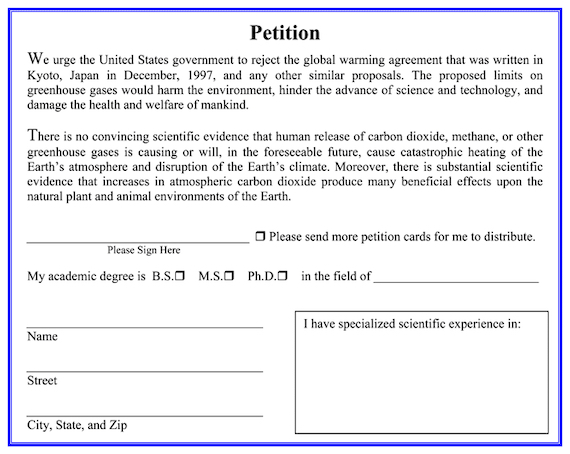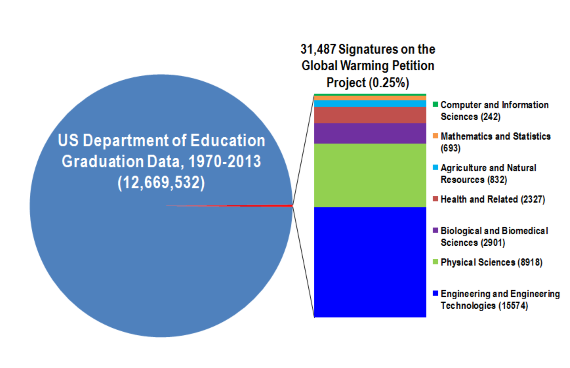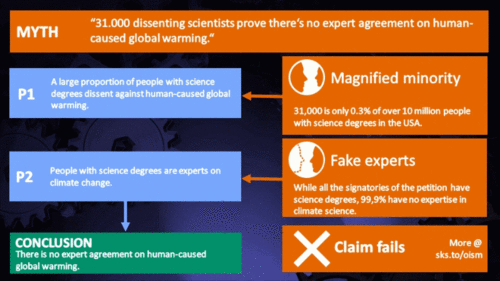The tricks employed by the flawed OISM Petition Project to cast doubt on the scientific consensus on climate change
What the science says...
| Select a level... |
 Basic
Basic
|
 Intermediate
Intermediate
| |||
|
The 'OISM petition' was signed by only a few climatologists. |
|||||
Climate Myth...
Over 31,000 scientists signed the OISM Petition Project
The Petition Project features over 31,000 scientists signing the petition stating "there is no convincing scientific evidence that human release of carbon dioxide will, in the forseeable future, cause catastrophic heating of the Earth's atmosphere". (OISM)
At a glance
Do you think that, just like politics, the laws of physics can be overturned by polls and petitions? Quick answer: no they cannot. But didn't you, or someone you know, read about a petition signed by thousands of scientists who disagreed with manmade global warming? The petition actually exists, but it changes nothing about the physical reality of the world. Below we explain why this is a flawed exercise and a "good" example for the denial techniques of fake experts and magnified minorities.
The petition was organised by the self-styled "Oregon institute for Science and Medicine" (OISM). OISM is a non-profit organisation, based at a location in rural Oregon, USA. The petition had two launches, initially in 1998 and again in 2007. People were invited to sign by self-certification, meaning anyone who said they were qualified in the physical sciences at a USA institution could take part.
The initial release of the petition was done as a response to the Kyoto Protocol, signed the year before. Kyoto was explicitly mentioned in the petition text. The petition text also claims that there is, "no convincing scientific evidence that human release of carbon dioxide, methane, or other greenhouse gases is causing or will, in the foreseeable future, cause catastrophic heating of the Earth's atmosphere and disruption of the Earth's climate".
There are some fairly obvious problems with the petition. To begin with, what guarantee is there that a graduate in engineering or medicine will know anything about climatology? None. We need to pause here and consider for a moment the term 'scientist'. Science is a broad field. One scientist may work in immunology, another in engineering. Would you go to the engineer if your immune system started playing up? If the answer is 'no', then good for you and you can likely see this major problem with the petition. But there's worse to come.
The documents accompanying the petition included a 'research paper' dressed up to look convincingly like official material from the National Academy of Sciences (NAS). Normally, we say, "imitation is the sincerest form of flattery". Not in this case. It was flat-out deceit. So misleading was this document that the NAS issued a press-release in April 1998, stating the following:
"The petition was mailed with an op-ed article from The Wall Street Journal and a manuscript in a format that is nearly identical to that of scientific articles published in the Proceedings of the National Academy of Sciences. The NAS Council would like to make it clear that this petition has nothing to do with the National Academy of Sciences and that the manuscript was not published in the Proceedings of the National Academy of Sciences or in any other peer-reviewed journal.”
Who signed? Some 31,487 people eventually - not necessarily all scientists as multiple enquiries have demonstrated - and even if they were that would still only represent 0.25% of all USA physical science graduates over the preceding 43 years. That's a prime example of the phenomenon of 'magnified minority', if there ever was one!
In the light of those figures, the key question would have to be, "so what do the other 99.75% of scientists think?"
Please use this form to provide feedback about this new "At a glance" section. Read a more technical version below or dig deeper via the tabs above!
Further details
Over the years since the threat of climate change emerged, there have been various moves by corporations and their think-tanks to downplay the perceived risk. Such moves have included making claims that large numbers of scientists disagree with the basic principles behind human-caused climate change. One of the most notorious such exercises manifested itself as a petition organised by the so-called 'Oregon Institute of Science and Medicine' (OISM), launched in 1998 and revived in 2007. This petition has apparently been signed by thousands of people with a self-certified BSc or higher science qualification. Signatories were invited to agree with the statements on display in fig. 1.
Fig. 1: The OISM petition, archived by Brian Angliss in 2015.
Accompanying the petition was a bizarre article, initially dressed up to resemble a scientific paper from the journal 'Proceedings of the National Academy of Sciences' (PNAS). In response, the NAS put out an official statement putting as much distance as possible between it and the OISM. The 'paper' was nothing of the kind. In fact, a cursory look at its content indicates the presence of fundamental errors in almost every paragraph. Desmog describes a 2007 version of the 'paper' thus:
"This exercise is so flawed that it’s hard to know what demands criticism the most. First, the whole exercise is being pushed by Arthur B. Robinson, the survivalist, Darwin skeptic and proprietor of something called the Oregon Institute of Science and Medicine. The “scientific” article on which the petition rests is authored by Robinson, his son Noah, and the American Petroleum Industry-funded Willie Soon, none of whom could hope to get their climate work published in a peer-reviewed science journal."
As to the statements that form the backbone of the petition, they are fundamentally flawed. There is no great debate on the core principles of human-caused climate change - in the professional field of climate science. Human carbon emissions are causing climate change. Continuing emissions at current levels is only going to make a bad situation far, far worse.
As of spring 2023, according to their website, the petition has been signed by "31,487 American scientists… including 9,029 with PhDs". Not much change from 2008 then, when OISM said it had over 31,000 signatures. The organisation's website does not stipulate how many signatories work in climate science. In fact, they specify their definition of 'scientist' as follows: anyone with a Bachelor’s, Master’s, or Doctorate of Philosophy in a field related to physical sciences can sign the petition. That is a wide, wide field indeed.
OISM petition signatories in fact represent a tiny fraction of all US science graduates (petition cards were only sent to individuals within the U.S). How tiny? According to figures from the US Department of Education's Digest of Education Statistics: 2008, at the time the relaunched petition was doing the rounds, 10.6 million science graduates had gained qualifications consistent with the OISM polling criteria since the 1970-71 academic year. 31,487 out of 10.6 million is not a compelling figure, but instead a tiny minority of 0.29 per cent. As Brian Angliss put it (in 2015, so the figure has dropped still further):
"Far from being an alleged “counter-consensus,” the 31,487 names collected by the Global Warming Petition Project represent only one quarter of one percent (0.25%) of science and engineering degrees awarded since 1970. (fig.2)"
Fig.2: the OISM petition signatories shown as a fraction (red) of all US Science graduates (blue) and the breakdown (R) of the disciplines who signed the petition and who therefore make up that tiny but magnified minority. Graphic: Brian Angliss.
Former New Scientist writer Peter Hadfield, who now runs the excellent 'potholer 54' Youtube channel dedicated to climate science explainers, made the point that scientists are not experts on every topic. In one of his videos in 2010, Hadfield said:
"In between Aaagard and Zylkowski, the first and last names on the petition, are an assortment of metallurgists, botanists, agronomists, organic chemists and so on.... The vast majority of scientists who signed the petition have never studied climatology and don't do any research into it. It doesn't matter if you're a Ph.D. A Ph.D. in metallurgy just makes you better at metallurgy. It does not transform you into some kind of expert in paleoclimatology."
Attempts like this to undermine the scientific consensus on climate change have ideological roots, variously connected with vested business interests and their political lackeys. The claims made in the OISM petition do not withstand objective scrutiny. Instead, a growing number of independent studies, examined here on Skeptical Science, have shown that around 97% of climate scientists in fact agree with the core principle that human greenhouse gas emissions are causing the climate to heat up and change. Whatever impression silly petitions signed by a tiny minority of science graduates might try to give, the scientific consensus on human-caused climate change is rock-solid.
Note - Aug 12, 2023: Following up on helpful reader feedback, we updated the title as well as the first paragraph to better spell things out.
Last updated on 12 August 2023 by John Mason. View Archives































 Arguments
Arguments



































I did peruse some Michigan names on this "petition". A couple of the 'good doctors' don't exist. I tracked down one of the veternarians. I would suggest some of you try that...maybe we could find a few more 'weasels.'
Gee, I never knew it was so easy to write off 30,000 people's opinions as being meaningless. You'd think it would at least cool the sanctimonious rhetoric about 97%.
Maybe someone needs a reality check?:
http://www.thegwpf.org/content/uploads/2013/09/Montford-Consensus.pdf
likeithot... No one writes off the opinions of 30,000 people. It just happens to be an extremely low figure once you put it into context.
The 30k figure is a subset of some 30 million people who fit the definition of the petition. Once you add the denominator you find that 30k is a very tiny number.
Once you refine the standards and focus on actual expertise in the subjest of climate change, then you find that 97% agree that humans are changing the climate primarilty through the emissions of CO2.
The article I cited explains clearly how the standars were "refined" with a clearly pre-meditaded (+unscientific) political adgenda.
likeithot @23.
Do you not feel that the OISM Petition Project has "a clearly pre-meditaded (+unscientific) political adgenda"?
I note elsewhere on this website you protest that your questioning went unanswered. With that sensitivity in mind, I would answer your question @21 by pointing out that the "someone" is surely the GWPF who certainly require a reality check. To publish that propagandist and scurrilous nonsense from Andrew Montford is, for an organisation registered as a UK educational charity, bringing the UK Charity Commission and the numerous legitimate charities it supports into disrepute.
Just a psychologist so I'm sure I don't count here, but I do know something about people and the herd instinct which I think is working here to a large extent. There is also, I am not a theologist, some evidence of the sin of greed. So many billions of dollars changing hands over a theory, really just a theory which looks more like a religion since you can't oppose it without retribution. Wise men should be skeptical.
I am quite relaxed about the climate getting warmer, I like summer better than winter, don't you? The people with coastline properties are probably those terrible "rich" people anyway whom we have all been told are sucking on our vital juices for their own benefit. Terrible people.
[Dikran Marsupial] Welcome to SkS (psychologists are most welcome). Please take time to read the comments policy, SkS is intended to be a site for productive discussion of climate science and closely related topics, but it is not a forum for the sort of trolling that is all too common on climate blogs. Further comments of this nature will be deleted. If you disagree with the mainstream position on climate science, then I would encourage you to pick a specific argument (see the list of climate myths on the bar to the left) and explain your objection clearly. I'm sure you will find plenty of people here willing to discuss the science with you in a rational and friendly manner, provided that you behave in a similarly mature manner.